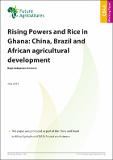| dc.contributor.author | Sebastian Amanor, Kojo | |
| dc.coverage.spatial | China | en |
| dc.coverage.spatial | Brazil | en |
| dc.coverage.spatial | Ghana | en |
| dc.date.accessioned | 2015-10-09T11:29:56Z | |
| dc.date.available | 2015-10-09T11:29:56Z | |
| dc.date.issued | 2015-07-01 | |
| dc.identifier.citation | Sebastian Amanor, K. (2015) Rising Powers and Rice in Ghana: China, Brazil and African agricultural development, FAC Working Paper 123, Brighton: Future Agricultures Consortium | en |
| dc.identifier.uri | https://opendocs.ids.ac.uk/opendocs/handle/20.500.12413/7091 | |
| dc.description.abstract | This paper examines the nature of Chinese and Brazilian investments in agricultural development by focusing on the irrigated rice sector in Ghana. It examines this through a historic perspective that traces policy towards the rice sector in Ghana, and the influence of various actors in developing this sector. Investment in the development of commercial rice originated in the 1970s when China developed smallholder demonstration rice projects and the government of Ghana pursued a policy of promoting large scale commercial rice production and smallholder contract farming on irrigation projects, tied to inputs suppliers and food marketers and processors. The paper then traces the changing fortunes of the irrigated rice sector under structural adjustment and government support for private sector investment in irrigated rice development in the late 1990s and early 2000s. This resulted in new investors entering rice production in Ghana, including Brazilian interests, and renewed interests from Chinese investors. It argues that the main trends in commercial rice production have been towards contractual relations in which accumulation occurs through control over supplies of inputs and marketing and that these are defined by the policies of the Ghanaian government. Although Brazilian companies have contributed towards innovation in this sector, they lack support from Brazilian agribusiness and agricultural development institutions. As a result of this their access to technology is constrained by the nature of Ghanaian markets and research establishments, and the lack of institutional embedding of Brazilian technologies within these. However, there are attempt by the Brazilian state to build up markets for machinery and develop joint research, although this occurs outside of rice. Although Chinese companies are absent from the development of rice, they have expressed interests in its future developments and are attempting to build up interactions between inputs supply, seed development and production, which will effectively embed Chinese technologies within Ghanaian research institutions and markets. The future of commercial rice production by these rising powers is likely to develop through expansion of seed development, inputs and machinery markets, and food trading and processing, rather than through a dramatic expansion in large estates. In this Chinese and Brazilian interventions are not markedly different from other agribusiness models. | en |
| dc.language.iso | en | en |
| dc.publisher | Future Agricultures Consortium | en |
| dc.relation.ispartofseries | FAC Working Paper;123 | |
| dc.rights.uri | http://www.ids.ac.uk/files/dmfile/IDSOpenDocsStandardTermsOfUse.pdf | en |
| dc.subject | Agriculture | en |
| dc.title | Rising Powers and Rice in Ghana: China, Brazil and African agricultural development | en |
| dc.type | Other | en |
| dc.rights.holder | Future Agricultures Consortium | en |

